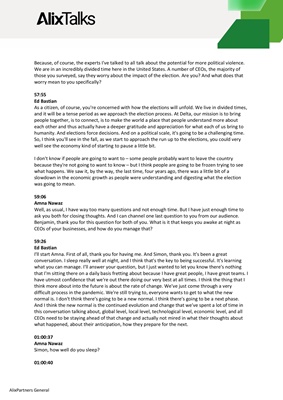
So, there's been a lot of attempts to sort of create much smaller, tighter, less big models that you
can essentially deploy much more easily and even deploy at the edge. So, I think the big model
players are going to be trying to continue to build the greatest model the world has ever seen, and
that trajectory is almost gone asymptotal for the next couple of years, and then there's going to be a
lot of engineering being done on how you can make these smaller models as well.
53:50
Amna Nawaz
A number of questions coming in now. I want to make sure I get people answers to the questions
they have. So, Simon, let me put this one to you about what companies should be doing right now.
Someone writes, "What should companies do now to help with AI adoption across their users
besides training on prompt engineering?" Maybe Simon and Michael, you can both answer that.
54:09
Simon Freakley
Well, I go back to something that we chatted about earlier, getting the right people in the room to
ask what the questions should be. I'm not a digital native. I have colleagues, of course, that are.
Angela Zutavern, who runs our AI practice, just somebody that really understands profoundly what
the right questions are in a given environment and makes sure that they are in the room testing the
management team to ask themselves a difficult question. That's the very first thing that people
should do.
54:32
Michael Kratsios
Yeah, and to me I think the short answer is every business problem doesn't require an AI solution.
And I think that's the challenge that we always see, where AI is sort of this panacea for whatever the
problem is. I think a lot of work can be done on working with very smart people like Simon and
others to sort of think through what are the types of problems that lend themselves well to AI
solutions and make sure that your teams aren't running and chasing things that you can't actually
change a lot with AI.
54:59
Amna Nawaz
Simon, let me get back to you about issues of people within the company, who's in the room and
where the responsibility, accountability lies. Someone's asking, "Chief legal and compliance officers
in financial services firms are very concerned about the adoption of AI tools as part of online
meetings for transcription, summarization, notetaking, et cetera, because of the regulatory
requirements around record keeping. So, although users are very eager to use them, what have you
seen, what's your experience with this situation and what are your highly regulated clients doing?
55:34
Simon Freakley
It's such a great question because, of course, and financial services is the right example, because the
financial services companies of which have been some celebrated examples, of course, recently,
some of whom have been under monitorships from the Department of Justice and others, as they
try to work through some of the issues they've had, the risks in adopting this new technology too
soon, without the appropriate checks and balances, the risks are completely out of kilter with the